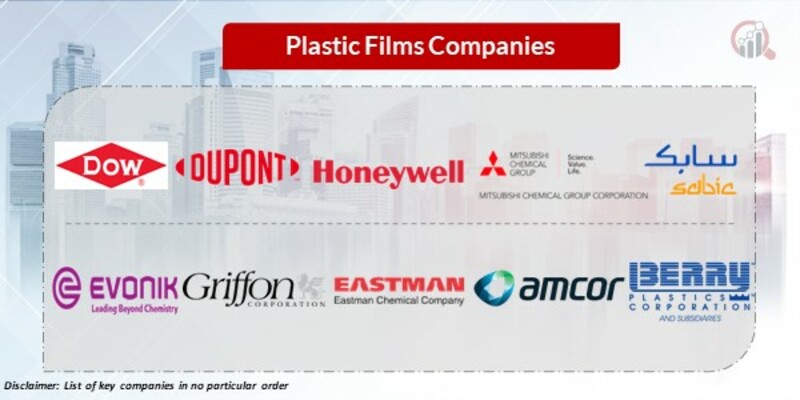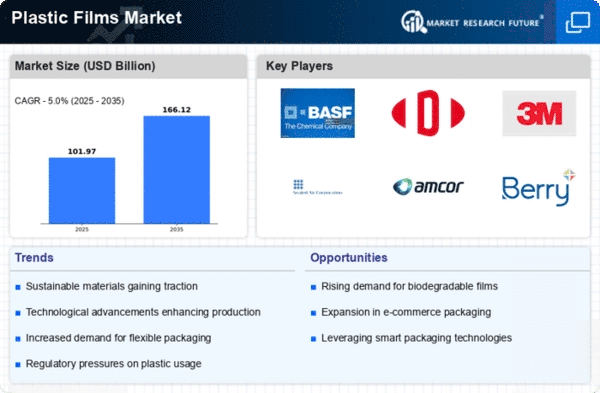Top Industry Leaders in the Plastic Films Market

Plastic Films Market
The plastic films market is a dynamic and ever-evolving landscape. Understanding the competitive strategies, market share factors, industry news, and recent developments is crucial for players to navigate this complex terrain. By focusing on product diversification, technological innovation, sustainability, and strategic partnerships, players can thrive in this competitive market and contribute to a more sustainable future.
Strategies for Market Share Domination:
-
Product Differentiation:Leading companies are investing heavily in R&D to develop specialized films with unique properties. This includes biodegradable and sustainable alternatives, high-performance films for demanding applications, and films with enhanced functionalities like barrier properties or anti-microbial coatings. Dow Chemical's launch of REnewables PLA (polylactic acid) films for sustainable packaging and ExxonMobil's development of OPTIC Advanced Films for solar panels exemplify this trend. -
Geographic Expansion:Emerging markets in Asia-Pacific and Latin America offer significant growth potential, attracting global players like Uflex and Jindal Films. These companies are establishing local production facilities and distribution networks to cater to regional demands. Acquisitions and strategic partnerships are also common tactics, as seen in Berry Global's recent acquisition of Aperio, a Brazilian specialty films manufacturer. -
Vertical Integration:To gain control over costs and supply chains, some companies are opting for vertical integration. This involves acquiring raw material suppliers or downstream businesses like converters or distributors. Such moves provide greater flexibility and responsiveness to market changes. -
Emphasis on Sustainability:Growing consumer awareness and regulatory pressure are driving the demand for sustainable plastic films. Leading players are responding by developing bio-based films, adopting recycling initiatives, and promoting circular economy models. BASF's development of ecovio® compostable films and Henkel's partnership with Plastic Energy to recycle post-consumer waste are prime examples. -
Technological Advancements:Innovation plays a crucial role in staying ahead of the curve. Companies are investing in automation, artificial intelligence, and advanced manufacturing technologies to optimize production processes, enhance quality control, and develop novel film solutions. Amcor's adoption of AI-powered line optimization software and Treofan's investment in a new high-tech production line for biaxially oriented polypropylene (BOPP) films are testaments to this focus on technological advancement.
Factors Influencing Market Share:
-
Production Capacity and Efficiency: Companies with robust production capabilities and efficient operations have a cost advantage, enabling them to offer competitive pricing and secure larger market shares. -
Product Portfolio and Quality: A diversified product portfolio catering to various market segments and a consistent focus on quality are crucial for attracting and retaining customers. -
Brand Reputation and Customer Relationships: Strong brand recognition and established customer relationships provide a competitive edge, building trust and loyalty. -
Innovation and Sustainability Initiatives: Companies leading the charge in developing sustainable and innovative plastic film solutions often gain market share due to their ability to respond to current trends and anticipate future needs. -
Geographical Footprint and Market Access: Strong presence in key geographical markets and established distribution networks are essential for reaching a wider customer base.
Key Companies in the Plastic Films market includes
- The Dow Chemical Company
- DuPont
- Honeywell International Inc.
- Mitsubishi Chemical Holdings Corporation
- Saudi Basic Industries Corporation (SABIC)
- Evonik Industries AG
- Griffon Corporation Inc.
- Eastman Chemical Company
- Amcor Limited
- Berry Plastics Corporation, among others
Industry News
August 2023: ExxonMobil announces plans to invest $650 million in a new manufacturing facility for high-performance films in China, targeting the growing demand for electronic and healthcare applications.
September 2023: The European Commission proposes a new regulation to restrict the use of single-use plastics, potentially impacting the market for traditional plastic films used in packaging.
October 2023: Dow Chemical collaborates with NatureWorks to develop new compostable films made from Ingeo™, a bio-based PLA resin, catering to the rising demand for sustainable packaging solutions.
December 2021: Amcor announced the opening of its state-of-the-art healthcare packaging facility is Singapore. This dedicated healthcare packaging facility will help the company to address rapidly increasing healthcare packaging demand across the Asia Pacific region.










